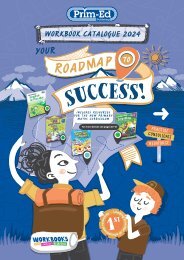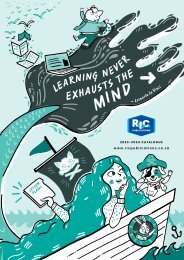20602_AC_Economics_and_buisness_Year_6_Making_choices_about_resources
You also want an ePaper? Increase the reach of your titles
YUMPU automatically turns print PDFs into web optimized ePapers that Google loves.
Trade-offs <strong>and</strong> the cost of lost opportunities – 1<br />
What are your favourite things to do? Maybe<br />
you like to play football or attend dancing<br />
lessons. Perhaps you are an avid reader or<br />
you just like chatting on the phone.<br />
The moment you choose any of these<br />
things, you are making a decision <strong>about</strong> how<br />
to spend your time. You are giving up one<br />
thing so you can do something else. For<br />
example, if you decide to chat on the phone,<br />
you might be giving up the opportunity to<br />
finish your homework. (No-one said that an<br />
alternative had to be something fun!) Most<br />
decisions we make involve trade-offs. A<br />
trade-off is made when you trade in or swap<br />
one thing to gain another. This can have<br />
positive or negative results. In the example<br />
above, trading off the opportunity to do your<br />
homework might result in a poorer mark in<br />
your school report.<br />
There may be many alternatives to<br />
something you choose, but there is always<br />
one ‘next best’ alternative. In economics, the<br />
value of the next best alternative is called<br />
opportunity cost. In other words, in making<br />
<strong>choices</strong> <strong>and</strong> trade-offs, you are paying the<br />
cost of a lost opportunity.<br />
To give another example, let’s say you are<br />
keen to start two activities—Scouts <strong>and</strong><br />
soccer training. But to your dismay, they are<br />
held on the same night in your local area.<br />
You must choose one or the other, so you<br />
have to make a trade-off. You decide to<br />
choose Scouts. The opportunity cost is the<br />
enjoyment <strong>and</strong> value you might have had<br />
from the soccer training—<strong>and</strong> perhaps even<br />
the chance to try out for a community soccer<br />
team. Of course, choosing Scouts will have<br />
advantages too—you might make a good<br />
friend or learn outdoor skills.<br />
choosing between alternatives. It is important<br />
to remember that when you buy something,<br />
the opportunity cost is the value of the next<br />
best alternative—not the cost of the product.<br />
For example, if you choose to spend $5 on<br />
a pie rather than a s<strong>and</strong>wich for lunch, the<br />
opportunity cost is the enjoyment of eating<br />
the s<strong>and</strong>wich (not the $5). For a business<br />
owner who decides to purchase pianos over<br />
electronic keyboards for his music school,<br />
the opportunity cost is the technology the<br />
keyboards could have offered, not their price<br />
tag.<br />
Opportunity cost in business relates to<br />
decisions made <strong>about</strong> human, capital<br />
<strong>and</strong> natural <strong>resources</strong>. For example, if a<br />
department store decides to employ younger<br />
sales assistants over older sales assistants,<br />
the opportunity cost is the experience <strong>and</strong><br />
knowledge of the older staff. If a construction<br />
company decides to buy its equipment<br />
rather than rent it, the opportunity cost is the<br />
chance to use new <strong>and</strong> reliable equipment.<br />
If a carpet cleaning business decides to use<br />
chemical-based products rather than natural<br />
ones, the opportunity cost could be water<br />
pollution.<br />
The most important thing to remember<br />
is that every choice people make as<br />
consumers <strong>and</strong> business owners has an<br />
opportunity cost—<strong>and</strong> these can have a great<br />
impact on our lives.<br />
The concept of opportunity cost can also<br />
be seen at work in business settings, for<br />
both consumers <strong>and</strong> business owners. As<br />
a consumer, you must constantly decide<br />
how to spend your money, which means<br />
R.I.C. Publications ® www.ricpublications.com.au Australian Curriculum <strong>Economics</strong> <strong>and</strong> business (<strong>Year</strong> 6) 3


















